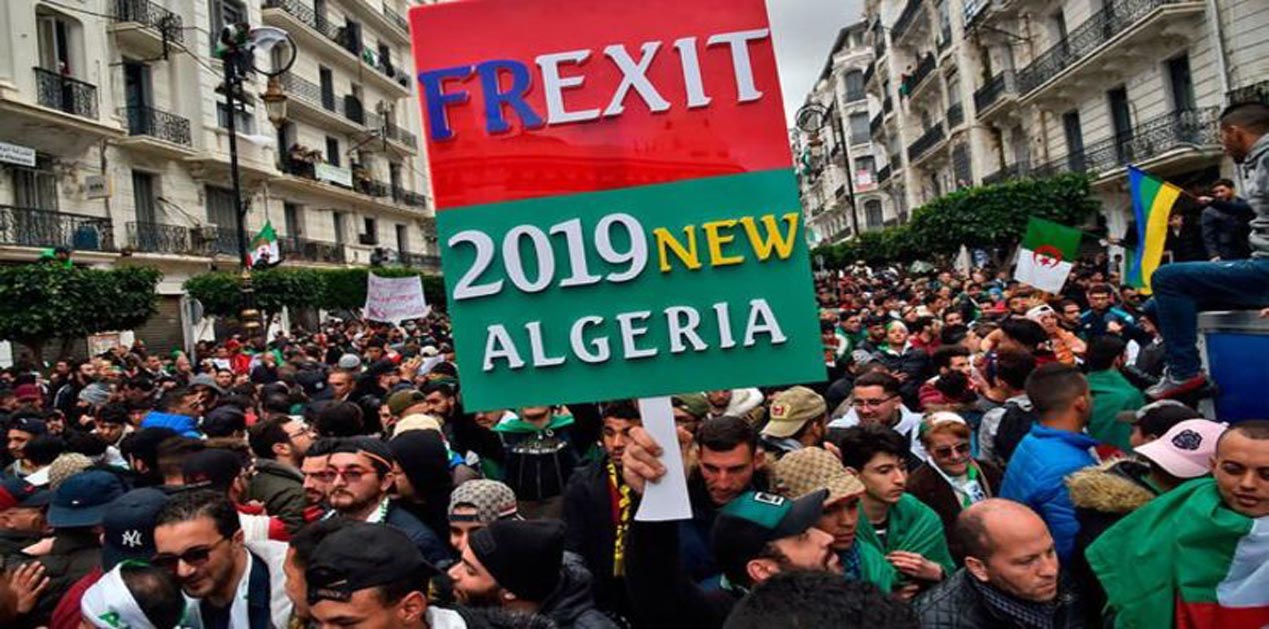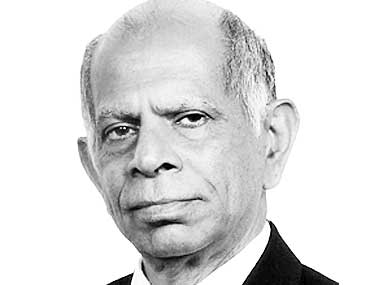When it was generally assumed that the Arab Spring that began by felling dictators one by one in 2011 (Ben Ali in Tunisia, Hosni Mubarak in Egypt, Muhammed Ghaddafi in Libya, followed by Ali Saleh in Yemen in 2012) had lost its way, with none of the countries a democracy except Tunisia, Algeria and Sudan have surprised us with a sustained revolt against dictators in the first quarter of 2019. In this article we shall deal with Algeria only.
For long, scholars have held that Algeria is an 'exception' meaning that there cannot be a serious and sustained revolt against the established authority in that hydrocarbon rich country that gained freedom in 1962 by an armed revolt against its colonial master France. That revolt cost about 300,000 lives. Algeria has not known democracy, nor even moved in that direction in any meaningful manner. Political power has been held by an elitist clique composed of the National Liberation Front (NLF) plus one or two other political parties, the military, and the rich. When attempt was made in early 1990s to take Algeria towards democracy, the result was disastrous with the nation entering a 'black decade' that saw the establishment using the state power to put down dissent by killing a huge number of human beings. Nobody knows for sure how many were killed, with some estimates going up to 200,000.
Briefly, in the first phase of the general election held in December 1991, the Islamic Salvation Front, newly formed, gained a landslide victory over the NLF. An alarmed establishment responded by removing from office a pro-reform minded President Chadli Bendjedid, and cancelling phase 2 of the general election with the military taking over and declaring an emergency. In the subsequent years, innocent Algerians were killed by the state which carried out a successful campaign of dis-information fooling the rest of the world and even a majority of Algerians into believing that the military by its decisive action had 'saved' Algeria from Islamic extremists. The Algerians feared that any revolt against the established authority, whom they refer to as le pouvoir, will beget another 'black decade'. This is the background to the theory of Algerian 'exception'. Scholars explained the absence of any sustained revolt in Algeria in 2011 on this basis. Obviously, the 'exception' rule is by now outdated.
Let us briefly recall the current revolt that began on 22nd February 2019, a Friday, when the public, cutting across all divides, came on to the streets in large numbers in protest against the announcement of President Bouteflika's seeking a fifth term by contesting the presidential election due on 18th April.
There is need to correct a misunderstanding here. Some media reports have implied that it was Bouteflika himself who wanted a new term. The establishment has been reticent for years about the state of health of Bouteflika. In 2005, he spent three weeks in the military hospital Val-de-Grace in Paris when he had ‘hemorrhagic ulcer in the stomach’. Since 2012, he has been appearing in public only rarely. In 2013, following a stroke he was hospitalized for 80 days, initially at the same military hospital. In April 2014, when he appeared for the first time in public since 2012, he was on a wheel chair seeking re-election. He cannot speak either. Despite his ill health he won.
The Algerian public believes with reason that Bouteflika has been only a 'figure head' since his illness and that his entourage that includes his brother, Said, 61, who controls access to him, has been running the show, and that a fifth term was proposed only because the entourage could not agree on a replacement. It is not certain that Bouteflika, 82, himself was keen on another term.
In response to the revolt, it was announced that Bouteflika would step aside after one year and that there would be a new election based on reforms decided through national consultations. Lakdhar Brahimi, foreign minister (1991-93) and a famous UN Peace envoy was appointed to start the national consultations. The revolt continued and soon cracks appeared in the establishment with the Army Chief Lt Gen Ahmed Gaid Salah publicly calling for the removal of Bouteflika as his state of health prevents him from carrying out his functions. The call was made on 26th March, but Bouteflika stepped down only on 2nd April.
If le pouvoir calculated that it could remain in power without Bouteflika and bring the revolt to an end by promising democratic reforms it was a serious error of judgment. The revolting Algerians want to bring down le pouvoir and take the country to a democratic destination. The demonstrators have made it clear that the 'Three Bs' should step down - Bensalah(interim President), Bedoui ( Prime Minister), and Belaiz (president of the Constitutional Council). Belaiz has already stepped down and the demonstrators have been carrying placards calling on interim president Bensaleh to step down. They have rejected Bensaleh's declaration to hold a presidential election by 4th July.
The establishment has started some cleaning up operations. Ahmed Ouyahia, Prime Minister four times under Bouteflika, and Mohamed Loukal, the current Minister of Finance, have been charged with "dissipation of public funds" and "illegal privilege" and a tribunal is trying them. Ali Haddad, a prominent businessman close to Bouteflika, was arrested while trying to flee to Tunisia and he is in prison. So far, people taking to the street in millions in Alger, Oran, Constantine and other cities are not convinced that le pouvoir will hold a free and fair election and they want to replace it by a popularly acceptable leadership. But, that is the crux of the problem. Le pouvoir is not willing to be replaced and even if they were, who is there to replace them? Can the millions demanding a peaceful transfer of power choose a leadership and if so how?
We should not give up hope. The demonstrations have been peaceful and the state has not used violence in a big way against the demonstrators so far. But, the military has issued warnings and an 18-year old demonstrator injured has died.
The Algerian people might find a way out of this dilemma. It is too soon to mention names.
Image Source: https://cdn.images.express.co.uk/img/dynamic/78/750x445/1104069.jpgam










Post new comment